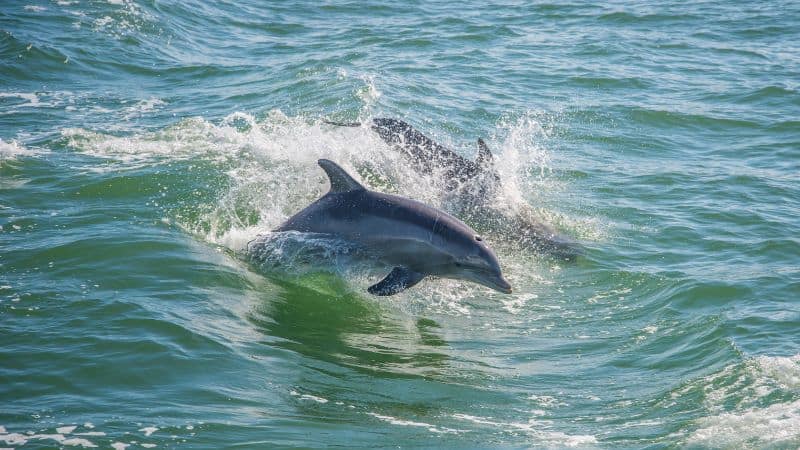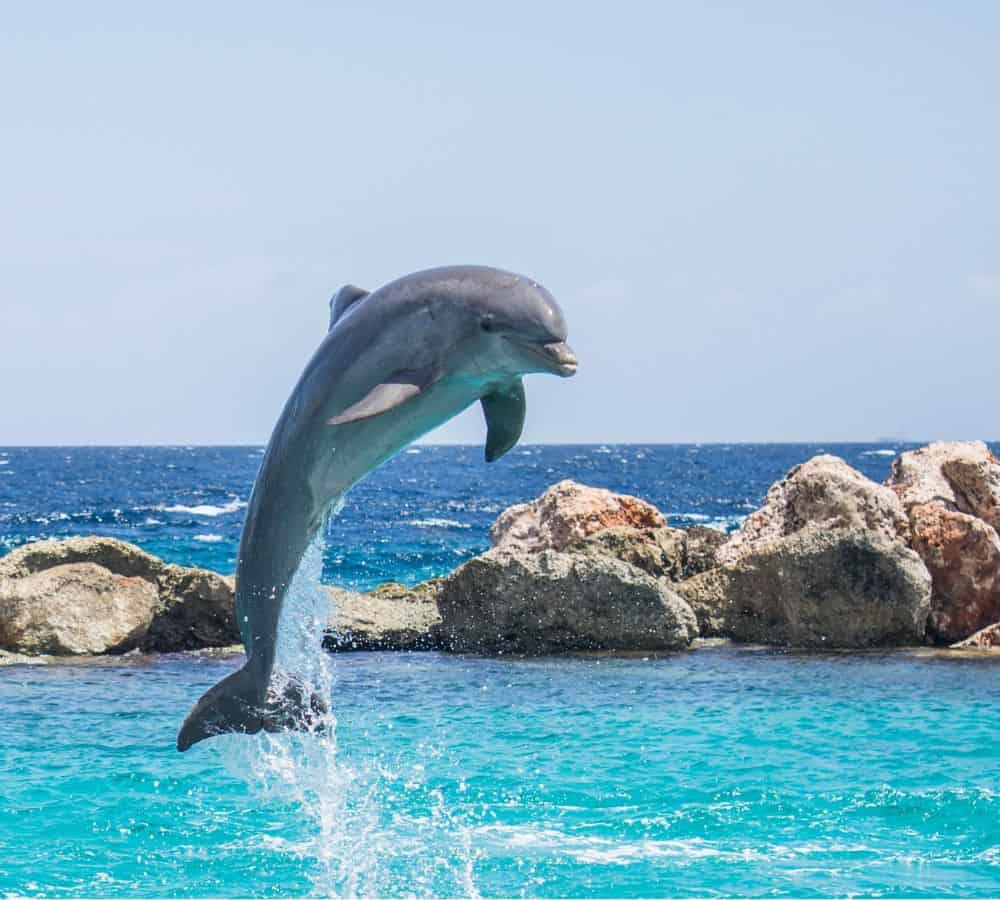Is It Ethical to Swim with Dolphins?
Swimming with dolphins is a popular tourist activity, but is it ethical?
Some argue that it is a harmless and enjoyable experience, while others believe it is cruel and harmful to the dolphins. I have had them come up to me while I was freediving and scuba diving on different occasions, and while this is an enjoyable experience, it is very random when it happens, and I don’t force or encourage it. I always make sure to give them ample space and never touch or feed them.
For most people, the opportunity to encounter them in the wild is unique; more often than not, people are interacting with them in captivity (which I will cut to the chase and tell you is in no way ethical).
Why might it not be ethical to interact with these intelligent marine mammals in such a close and invasive way (in captivity or in the wild)? Does it harm them and their natural habitats in the wild?
We will explore the different perspectives and relevant statistics surrounding the ethics of swimming with dolphins and also provide alternative ways to interact with them that are less invasive and more ethical.
This article contains affiliate links and Veggies Abroad is a member of Amazon Services LLC Associated Program. At no cost to you, I may earn a small commission if you make a purchase — this helps keep Veggies Abroad churning out free content! For an explanation of our advertising policy, click here.
The Appeal of Swimming with Dolphins
Swimming with dolphins is a unique and thrilling experience that many people find irresistible. According to a survey conducted by the International Fund for Animal Welfare (IFAW), about 13 million people worldwide participate in dolphin-watching or swimming tours each year (these dolphins are usually all held in captivity). People are drawn to these activities for various reasons, such as:
- It is a chance to see dolphins up close and personal
- The opportunity to learn about their behavior and biology
- The belief that interacting with dolphins has therapeutic or spiritual benefits
- They think it looks good on social media
While that sounds great, the popularity of swimming with dolphins also has a dark side.

The Ethical Debate: Dolphins in Captivity & in The Wild
One of the main ethical concerns surrounding swimming with dolphins is the captivity of these animals. Many dolphins used for these experiences are kept in small tanks or pools, which can cause stress and health problems. In the wild, dolphins swim up to 60 miles a day, but in captivity, they may only have access to a small area. Additionally, dolphins are highly social animals that live in groups, but in captivity, they may be separated from their families and forced to interact with humans instead. These conditions can lead to physical and psychological harm to the dolphins.
In addition to interacting with dolphins in captivity, there are also concerns about human interaction with dolphins and their natural habitats in the wild. Here are some of the different perspectives on this issue:
Proponents of Swimming with Dolphins
Some people argue that swimming with dolphins can be a positive experience for both humans and dolphins. They point out that:
Dolphins are social and curious animals
that may approach humans on their own accord, which I have had happen. But my encounters were random, and I never went out looking for them.
Swimming with dolphins can foster awareness and respect
for marine life and the environment. For those who never have seen dolphins in the wild, this could make sense.
Responsible and regulated dolphin watching and swimming tours can
support local economies and conservation efforts. It can stop people from fishing and doing other harmful activities.

Critics of Swimming with Dolphins
On the other hand, many experts and animal welfare organizations caution against swimming or diving with dolphins, citing the following concerns:
Stress and harm to dolphins from close encounters with humans
Dolphins are wild animals, and they may experience stress and harm from close encounters with humans, especially if they are forced to interact or perform tricks. Unlike domesticated animals, dolphins have not evolved alongside humans, and their natural instincts may not be compatible with human interaction.
Disruption of natural behavior and migration patterns
Swimming with dolphins can disrupt their natural behavior and migration patterns. Dolphins need to hunt for food, communicate with their pods, and engage in other essential activities. When their daily routines are disrupted by human interaction, it can have long-term consequences on their well-being and survival.
Exposure to pollution, boat traffic, and other hazards
Swimming with dolphins can expose them to pollution, boat traffic, and other hazards. These factors can lead to injury, illness, or even death for dolphins. Additionally, the presence of boats and humans can scare away fish and other prey, making it difficult for dolphins to find food.
Capture and captivity driven by dolphin tourism
The demand for dolphin tourism can drive the capture and captivity of dolphins. This results in physical and psychological suffering. Captive dolphins often live in small tanks and are subjected to restrictive conditions and isolation from their natural social groups. These conditions can lead to stress, illness, and shortened lifespans. They are also caught in horrible ways, like in the annual Taji Dolphin slaughter in Japan.

Research Supporting the Negative Impact of Human and Dolphin Interaction in the Wild & Captivity
- According to a study published in the Journal of Marine Animals and Their Ecology, dolphin populations in areas with high levels of tourism and human activities have lower survival and reproduction rates than those in less disturbed areas. This finding suggests that frequent human interaction can have negative effects on dolphin populations.
- The World Animal Protection Organization estimates that about 3,000 dolphins are currently held in captivity for entertainment purposes around the world. These captive dolphins often live in small tanks and are subject to restrictive conditions, which can lead to stress, illness, and shortened lifespans.
In light of these concerns, critics argue that swimming with dolphins should be avoided or severely restricted to protect the welfare and conservation of these intelligent marine mammals.
Is There an Ethical Way to Interact with Dolphins?
If you want to enjoy the beauty and intelligence of dolphins without harming them, there are alternative ways to interact with them that are more ethical. Consider one of these activities:
Dolphin Watching Tours
A good option to see them is on a dolphin-watching tour. These are popular alternatives to swimming or diving with dolphins. These tours involve observing dolphins in their natural habitat from a safe distance without disturbing or interacting with them. This approach allows you to appreciate the beauty and behavior of dolphins without causing them stress or harm.
If you decide to go on a dolphin-watching tour, make sure to choose a reputable and responsible tour operator that follows ethical guidelines for wildlife viewing. Look for operators that comply with local regulations, minimize their impact on the environment, and prioritize the safety and comfort of both dolphins and passengers.

Educational Programs
Another way to interact with dolphins in an ethical way is through educational programs that teach about dolphin biology, ecology, and conservation. These programs can include lectures, workshops, and interactive exhibits that provide insights into the world of dolphins and their role in the marine ecosystem.
Some educational programs also offer opportunities to observe dolphins in a controlled and non-invasive environment, such as through underwater cameras or virtual reality simulations. These experiences can help you appreciate the intelligence and complexity of dolphins without disrupting their natural behavior or habitat.
Volunteer Opportunities
If you are passionate about marine conservation and want to contribute to the well-being of dolphins, consider volunteering for organizations that support research, rescue, and rehabilitation efforts for dolphins and other marine animals. These organizations often work in collaboration with local communities, scientists, and policymakers to promote sustainable and responsible approaches to marine conservation.
Volunteering for such organizations can provide you with firsthand experience and knowledge about the challenges facing dolphins and their habitats, as well as opportunities to make a positive impact on their survival and well-being.
Wrap it up: Is it Ethical to Swim with Dolphins?
Swimming with dolphins in a controlled environment is never ethical. These tours and activities can cause great harm to the animals. It is also not ethical to try and force or encourage dolphins to swim with you in the wild, either by baiting them or chasing/cornering a pod.
Instead, look for activities that prioritize the conservation and protection of these intelligent and beautiful animals. If a tour ever guarantees that you will see a dolphin, run the other way. Any activity that guarantees something means it isn’t ethical, and animals are being forced (in a way that tourists might not see) to perform.
By exploring alternative ways to interact with dolphins that are less invasive and more ethical, we can still appreciate their beauty and wonder while respecting their right to live freely and naturally in the ocean.
More Vegan Travel Help
Whether you’re planning a trip or just looking for inspiration, you’ve come to the right place. Check out these helpful guides and articles!
Vegan and Vegan-Friendly Resorts Not to Miss in Bali
How to Travel with Only Carry-On Luggage
Where in the Caribbean is Vegan-Friendly?
Vegan Travel Snacks & Essentials Not to Leave Home Without
The Most Comprehensive Vegan Guide to Iceland
About the Guest Author:
Teagan Kane (aka Teagan, the Vegan!) is a certified SCUBA diver and freediving instructor with Infinite Blue Dive Travel. Giving up fish was his first step toward veganism when he learned that ocean life is disappearing at an alarming rate. Originally from the US, Teagan has been teaching in Asia and the Middle East for the last 14 years. His mission is to help others on their journey toward veganism while showing the delights the ocean and cuisines around the world have to offer.







